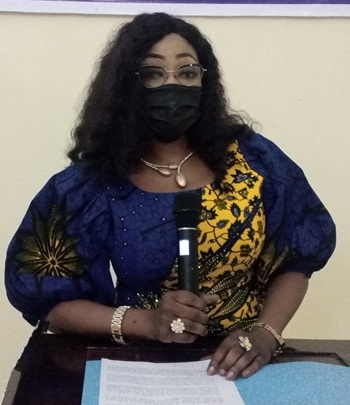The National Coordinator of the Open Government Partnership (OGP) in Nigeria, Dr. Gloria Ahmed, has said that Freedom of Information (FOI) Desk Officers of public institutions are central to and critically important for the achievement of Nigeria’s commitments in the area of access to information under the country’s OGP National Action Plan.
In a goodwill message she delivered at the opening of a workshop for FOI Desk Officers of public institutions on the establishment of an online FOI platform, held in Abuja on February 1 and 2, 2022, Dr. Ahmed, who is also the Director of Special Duties at the Federal Ministry of Budget and National Planning, noted that the Desk Officers are the ones to facilitate the realization of the commitments in their respective institutions.
She explained that the OGP, which was launched in September 2011 and which Nigeria joined its 70th member in July 2016, is a multilateral initiative founded on a partnership between government and civil society, including the private sector, that aims to secure concrete commitments from governments to promote transparency, empower citizens, fight corruption, and harness new technologies to strengthen governance.
According to her, the OGP framework has many benefits for member countries and their citizens as it aims to empower citizens and improve the public’s participation in governance, in the fight against corruption, in harnessing innovation and utilising new and emerging technologies to attain these and strengthen governance.
Explaining the OGP structure in Nigeria, Dr. Ahmed said it has a 20-member National Steering Committee and is currently co-chaired by Prince Clem Agba, the Minister of State for Budget and National Planning, who is the Government Co-Chair; and Dr. Tayo Aduloju, a Senior Fellow for Public and Institutional Development at the Nigeria Economic Summit Group (NESG), who is the Non-State Actors Co-Chair while she serves as the National Coordinator and Head of the Secretariat.
She recalled that when Nigeria signified its intention to join the OGP through a letter addressed to the then Co-Chairs of the International Steering Committee by the Attorney-General of the Federation and Minister of Justice, Mr. Abubakar Malami (SAN), on June 20, 2016, one of the commitments it made right from the onset was that Nigeria would work to enhance Freedom of Information.
Dr. Ahmed said the two National Action Plans (NAPs) that Nigeria has developed as part of its engagement within the OGP have sought to honour this commitment as access to information has been among the broad thematic areas contained in both the first NAP for the period 2017 to 2019; and the second NAP, for 2020 to 2022.
She explained that two of the 14 commitments contained in the first NAP were devoted to access to information while two of the 16 commitments in the second NAP also centre on access to information, adding that “The two commitments in each of the National Action Plans have focused on improving implementation of the Freedom of Information Act, 2011.”
Dr. Ahmed stressed that the situation demonstrates the importance of the effective implementation of the FOI Act is to Nigeria’s engagement within the OGP and the realization of the goals contained in the country’s NAP.
She told the participants that “As the FOI Desk Officers of your respective Ministries, Department and Agencies, you are central to and critically important to the achievement of our commitments in these areas. You are the ones to facilitate these goals in your various MDAs.”
Dr. Ahmed also explained that the OGP has an Access to Information Thematic Working Group among our seven thematic working groups, which is a resource to help Nigeria in implementing the Access to Information commitments in the NAP.
She said it is also a resource for FOI Desk Officers as part of the mandate of the Working Group is to provide support to ensure full compliance with the access to information obligations of public institutions in order to improve their access to information-related performance and ranking.
Dr. Ahmed stated that “We also see the Working Group as an avenue for the facilitation of peer learning and exchanges as well as mentorship through the provision of concrete opportunities for the sharing of experiences that encourage deeper learning of various access to information practices, building capacity, and sharing best practices.”
She explained that the working group is also intended to support the development of new research and analysis related to access to information commitments as well as the dissemination of other relevant information among its members, such as reports, research and articles related to access to information and the OGP.
Dr. Ahmed drew parallels between the work of the OGP, particularly the functions of the Access to Information Working Group, and the objectives of the workshop, which she noted, also seeks to facilitate shared learning and experience sharing among FOI Desk Officers as well as best practice application in the implementation of the FOI Act.
She urged the FOI Desk Officers to take full advantage of the support that the workshop and the processes following it as well as the OGP framework have to offer in enabling them to perform their functions more effectively, adding “you should also aim to contribute, through your own implementation and compliance activities within your respective public institutions, to the achievement and realization of Nigeria’s access to information commitments.”






